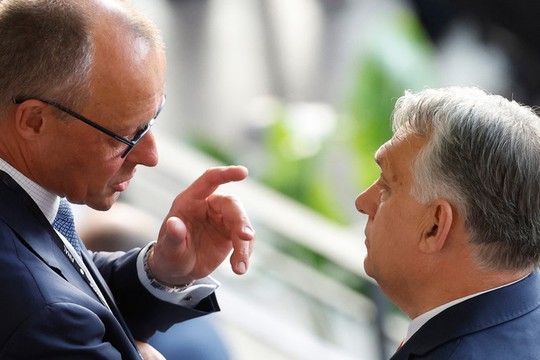Chancellor Friedrich Merz (left) and PM Orban.
Photo: hvg.hu
Friedrich Merz’s incoming coalition wants to press the EU to look at withholding funds and suspending voting rights from Hungary, according to a document seen by POLITICO. The time has come to punish Orbán, Germany’s government says.
Germany’s incoming government says it will press the European Union to finally add some bite to its bark over misbehaving countries ― in a thinly veiled reference to Viktor Orbán’s Hungary.
The conservatives of chancellor Friedrich Merz and their likely center-left coalition partner, the Social Democratic Party (SPD), have agreed to demand the bloc withhold funds and suspend voting rights from countries that violate key principles such as the rule of law, according to a draft coalition agreement seen by POLITICO.
While Hungary wasn’t mentioned by name, the draft agreement is clearly referring to the EU’s worst offender, which for years has been accused of taking a wrecking ball to democratic norms, curtailing the freedom of the press and restricting the independence of judges.
The German parties ― Merz’s victors and the SPD who led the last government ― are currently negotiating to form a coalition and need to agree on underlying principles before taking office. An agreement to pressure the EU to go after countries like Hungary forms part of a series of provisional deals covering issues as diverse as migration policy, the phaseout of coal and welfare spending.
The European Parliament triggered the first phase of the Article 7 procedure — also known as the “nuclear option” — against Hungary in 2018 over suspected “serious breaches” of the bloc’s core values and fundamental rights. But the process, which could lead to the suspension of Hungary’s voting rights, has stalled because of political divisions among member countries.
In 2022, the European Commission moved to block about €22 billion in EU cash earmarked to Hungary amid concerns over human rights and the independence of the judiciary. It eventually unfroze more than €10 billion last year, sparking a backlash.
Another point of contention between the EU and Hungary’s government has been Orbán’s friendliness toward Moscow, with Budapest repeatedly making use of its veto power to block sanctions on Russian oligarchs and military chiefs.
To circumvent that veto power, the incoming German government wants to “advocate an expansion of qualified majority voting in the Council of the EU, particularly on certain issues of the Common Foreign and Security Policy (CFSP), such as the imposition of sanctions.” That would enable decisions to be taken without the need for Hungarian approval.
More broadly, the coalition negotiators vowed to take on a more proactive role on the European stage by using the Weimar Triangle — a loose alliance of France, Germany and Poland — as a vehicle for shaping EU policy. Under the previous coalition government led by the SPD’s Olaf Scholz, Germany’ relationship with France and Poland deteriorated.
read more in our Telegram-channel https://t.me/The_International_Affairs

 12:00 22.05.2025 •
12:00 22.05.2025 •























